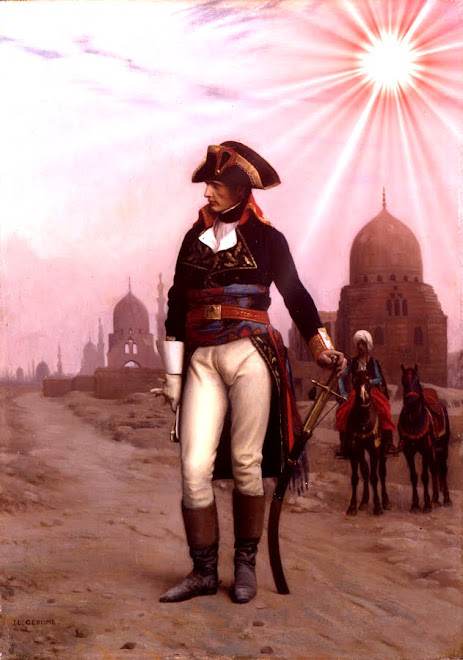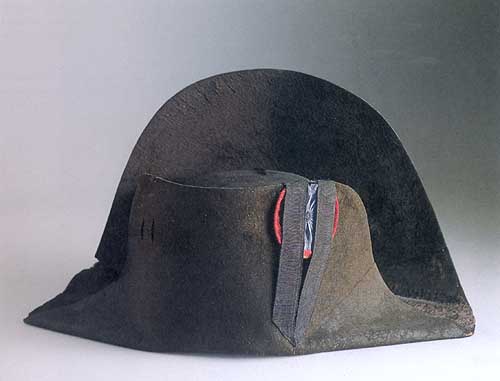THE REAL NAPOLEON - The Untold Story
I am very pleased to announce that I have just signed a contract with The History Press who are going to publish my book later this year - the 200th anniversary of The Grand Army's invasion of Russia. It is hard to believe that two whole centuries have passed since those momentous days when the likes of Coignet and Bourgogne showed just what human beings could endure during the coldest Russian winter in a century.
Recently, in a branch of Waterstones I noticed that they were still selling Paul Johnson's character assassination of The Emperor. He blamed Napoleon personally for 'all the wars' which is complete nonsense. Alongside it on the shelves was Frank McLynn's book - readable - but he was far from a fan as well.
Yesterday, I watched a superb programme about Carthage and how it was destroyed and its very memory erased from the pages of history by Rome. For five hundred years Carthage had an empire when Rome itself was "Hicksville on the Tiber" according to the excellent presenter Richard Miles. Rome was jealous of the Carthaginian state and, more especially, of its immense wealth.
The Romans had no navy but in a bizarre turn of fate they discovered an intact Carthaginian vessel complete with builders' marks - so they were able to reconstruct the design 'to the letter'. Despite being massacred in early sea battles they later bested the Carthaginian fleet and took control of the whole of the western Mediterranean. But they also razed the city of Carthage to the ground and distributed salt so that nothing would ever grow there again. The population that survived the terrible fire as the city was taken were made slaves.
But the greedy, brutal and vengeful Romans went even further. They slandered and traduced everything the Carthaginians had ever stood for. They had burnt the magnificent library at Carthage so there was not even books or scrolls to 'speak up' for the lost empire of the Carthaginians. The Romans then said that the nobles of Carthage had burnt their own babies and children alive to appease their voracious gods and that they had perverted sexual practices. (Which is pretty rich coming from the Romans! Caesar himself tried to hide his homosexual dalliances as a young man). In short they utterly destroyed the memory of a civilization that had lasted for centuries.
I was instantly struck by the parallels with Napoleon and the British Empire. While he was alive, the English aristocracy and politicians spoke such a load of tosh about Napoleon to their own people and anyone else that would listen, that it is surprising they classed him as human at all - The Corsican Ogre was one of the lesser slurs used against him. It was said he slept with Hortense, his stepdaughter and other such scandals manufactured to belittle and degrade him. He was always drawn as a pygmy with a large nose by the caricaturists like Gilray and never given the status of 'the old nobility' and aristocracy in Europe. It was open season on Napoleon all year round. And, of course, Pitt and a cabal of degenerates in the Cabinet tried to murder him - a task they happily delegated to d'Artois and his creatures.
The first thing Louis XVIII wanted when he re-entered Paris in 1814 was Napoleon's personal fortune. The Emperor had been very careful with money, unlike his Bourbon predecessors, and the 320lb Louis wanted some to spend on his boyfriends.
The Carthaginians have had a bad press for two thousand years, but in the two centuries since Napoleon's death, hundreds of 'history' books have been written about him that are better fiction that anything written by Dickens or H.G.Wells. More books have been written about Napoleon than any other individual in human history. (I am very happy to add one more). Most of these books were anti-Napoleon diatribes that rehashed the same old twaddle and presented it as 'history'. In The Real Napoleon, I take many of them to task - it wasn't hard to show them as ignorant purveyors of lies and misrepresentation. In short, like in Animal Farm they started with "England good - Napoleon bad" and went on from there. And, of course, what was the 'bad' pig called in that book - Napoleon!
Thanks to regular readers of this blog, it is getting an average of 50 hits a day, over 1,000 a month - so I know there are people out there who are prepared to make up their own minds and are not going to drink in the bilge served up by so many 'English historians'. Napoleon was no saint, he made mistakes - sometimes bad ones, like the invasion of Russia itself - but had Austria and Russia lived up to the peace treaties they signed years earlier with him, there would have been no need for further conflict on the continent of Europe. But then again, there was all that English gold just ready for anyone who would attack France...
A belated Happy New Year to all readers of this blog - I shall keep you posted as to the publication date of The Real Napoleon.
C. John Tarttelin 2012
















